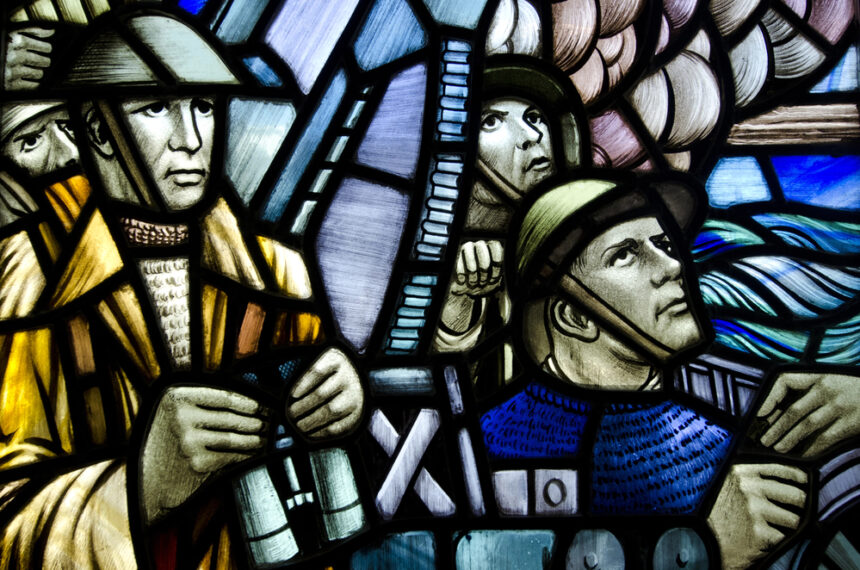Intro. (Recording date: May 28, 2024.)
Russ Roberts: Today is May 28th, 2024, and my guest is author Cynthia Haven of Stanford University. She is a National Endowment for the Humanities Public scholar. Among other books, she is the author of Evolution of Desire: A Life of René Girard, which was the first biography of the French theorist, published in 2018; and she’s the editor of René Girard’s All Desire Is a Desire for Being: Essential Writings, which was published in 2023. Cynthia, welcome to EconTalk.
Cynthia Haven: Pleasure to be here.
Russ Roberts: Our topic for today is René Girard and his ideas. We have a previous episode on Girard with Jonathan Bi that we’ll link to. But, I want to start with a bit about Girard’s life. He was born in 1923. He died in 2015. What was his career? Where was he? What was he writing about? He’s not a normal scholar with a narrow discipline, and he had a very unusual academic life.
Cynthia Haven: Yes. He began in Avignon, where he was born, went to the Ecole des Chartres. He followed in his father’s footsteps. His father had been the curator of the Palais des Papes. After the war–he was mostly in the Rcole during the war–he went to Paris, came back to Avignon, helped launch the first Avignon Festival, which is now a major event in Europe; and then he went to America. It was a great time for young men to be–America was looking for more European young men to supplement their colleges and their universities. He took the opportunity and went to Indiana, which is how he began his American career.
Russ Roberts: He ends up at Stanford. When did he arrive at Stanford?
Cynthia Haven: He didn’t arrive to Stanford until 1980. He went to Johns Hopkins, went to briefly to Duke and Bryn Mawr, went to Buffalo–was at the university there–went back to Johns Hopkins, and then went to Stanford. And Stanford is where he spent more time than any place else in his life.
Russ Roberts: If you had to pigeonhole him, what discipline would you say he’s in? What did he study and what did he write about?
Cynthia Haven: Oh. Ohhh. He kind of crossed boundaries, didn’t he? Technically, his Ph.D. was in history. He did American and French opinion during the war and after the war. He did the history of Avignon, I think, in the 14th, 15th centuries for the Ecole des Chartres.
But, something began to simmer in him in Indiana, and he began already thinking about what had happened with the war, what had happened with the bombing of Hiroshima. And, that kind of changed his direction. He was very influenced by Malroux.
He was also very influenced because in one of his early classes, he had a roll call–I love this little story–and he came across a name he couldn’t pronounce. The name was Martha McCullough. So, for a Frenchman, a name that ends with O-U-G-H was unpronounceable; and he solved the problem a few years later by marrying her. They were married for more than 60 years. It was a very happy marriage, a very contented marriage.
Russ Roberts: Beautiful.
Russ Roberts: So, the central ideas–he writes about lots and lots of different things. This book that we’ll be referring to is collected essays that you edited recently, All Desire Is a Desire for Being. Let’s start with the title, which is–in the back of the book, I really like it, you have a bunch of aphorisms. We may refer to a few others of Girard, but one of them is the title: ‘All desire is a desire for being.’ What did he mean by that?
Cynthia Haven: Well, I’m so proud of that because that was my discovery. There was a book of Q&A (Question and Answer) interviews with him–excellent. I highly recommend it–when these things begin, his interviews with Michel Treguer, and I was looking it over when I was working one of my earlier books about him. And that phrase just jumped out at me from the page. And nobody had noticed it before. And, it really takes the whole mimetic cycle that he developed one step earlier.
He always says, ‘It begins with envy’; but actually, the envy itself is beginning because we actually long to be someone else. We don’t want to just imitate them. We want to occupy them. We want to be them. And that is why all desire is a desire for being. We crave something other than we are.
Obviously, that can be a good thing. We can become better, but it also puts us in competition with other people: hence the problem.
Russ Roberts: We’ll talk about that in some length. But, the central idea of that–you used the word ‘mimetic.’ The concept that’s associated with Girard in this area is mimesis, which I loosely translate as imitation, but as you point out, it’s more than that. So, why don’t you elaborate a little bit on what Girard meant by mimesis?
Cynthia Haven: We are imitative beings. Imitation is how it drives us forward. We begin imitating as soon as almost seconds after we’re out of the womb. It’s why we learn, it’s how we learn. But it’s also how we come to fight with each other, because we’ll both reach for the same things, whether it’s a job, whether it’s an office suite, or a fancy car. We long to be something other than we are.
Russ Roberts: I think when I interviewed Jonathan Bi, I’m sure revealed I had not come across Girard’s ideas until literally a year or so, a few years ago at most. At first glance, there’s something very appealing about the theory as a descriptive theory. I’ve mentioned my granddaughter. I’ve had the privilege of watching most of her first two years of life at close range. One of my favorite examples that I think I’ve mentioned before is: she learned how to walk, and she is holding a milk carton; and she’s got the lid–the top of the milk carton in one hand–and the carton itself in the other. It’s empty. And she is walking around the room as if she has won an Olympic gold medal or cured cancer, because she is imitating the adults who walk around occasionally with a milk carton to make coffee.
Her language is all imitation. She will repeat endlessly things you say. She repeats things in English, in Hebrew. I could teach her French. I could teach her any language I want. She wouldn’t understand a lot of it, but I watch as she continually imitates. Over time, she starts to have conceptual understanding of things. And, it is a remarkable aspect of the human experience.
But, I think we like to believe that after we get to a certain age, that ends and we create ourselves. There’s a certain date at which we’re done with all that, and now we have a blank slate with a bunch of capabilities and we write on it our own desires. And of course, we are our own person.
Cynthia Haven: We’re kidding ourselves.
Russ Roberts: We’re kidding ourselves. And yet, this idea that we’re kidding ourselves makes, I think, many of us hearing this idea uncomfortable–which is good; nothing bad about that. Is there room for authenticity? If my desire is to constantly be something I’m not, someone I admire, someone I aspire to–as you say, it can be a good thing. But, if I’m always aspiring to escape my own self, what’s left of me? What’s authentic about me in that story?
Cynthia Haven: I don’t know how anything could be completely authentic because it’s got to come from somewhere.
I think that that’s one of the three major things that René did, is he upset the nature of our desire and our violence: first, that our desire is authentic in our own; second, that we fight from our differences rather than our sameness, which is also caused by this mimesis. And, well, he also made an argument that religion is not the cause of violence, but rather the way in the archaic world, our solution for controlling violence.
But, we’re going to see a lot of mimesis this year because it’s an election year, which always brings a lot of conflict and everybody will be pressured to think like everybody else.
Russ Roberts: So, explain this role of conflict. The book of essays opens, actually, with a very short essay on conflict that basically says it’s the essence of the human experience that we have conflict. We may fool ourselves into thinking it’s caused by something external, like, say, religious differences. But he says, ‘No, it’s rooted in our being.’ And, I am confused why imitation has to lead to conflict.
If we have someone–let’s take a positive view. If I have someone I admire, someone who I respect, and I want to put on their identity–I prefer it to the way I feel about myself–and I start imitating what they do, what they like, what they say, how they say it.
And of course, just to go back to the parenting/grandparenting child thing, it’s very eerie when you see children as adults, looking more and more like their parents–not physically, but in their gestures, in their desires. And you can see it in yourself sometimes in the mirror. Sometimes you feel it in your heart. And you realize, ‘Oh, my gosh. I’m becoming my father, or I’m becoming my mother.’ But, why should my love–love is not the right word–my envy or desire to be someone I’m not, whether it’s an athlete, a neighbor, or a pop star, why should that lead to conflict? Shouldn’t that be kind of a harmonious thing?
Cynthia Haven: No, ultimately I think we notice that somebody else is copying us or imitating us, and it creates irritation, because we think we’re authentic in our own. But in fact, we’re all the products of imitation. Like you say, you’re imitating your father or your mother or someone, how could you not? But, it creates conflict because the other person fights to keep themselves from appropriation or what they may see as appropriation. Or where they both become so much alike–which is what typically happens, that two people reach for the same thing.
You see that in Shakespeare all the time. Two guys are so close together. They’re swearing in Act One that they will be friends forever. And then a girl walks onto the scene. And they’re so much alike that they both fall in love with the same girl. So, instant conflict, because they both want the same girl. Or a kingship.
Russ Roberts: Or power. But it’s not just then about, say, cultural transmission, which is clearly a powerful force in people’s day-to-day lives, whether they’re, again, aware of it or not. It also leads to much more complicated competition for power, women, men, fill in the blank. And that leads in Girard’s view to much of, if not all of what makes us at each other’s throats? Is that true?
Cynthia Haven: Well, I don’t know how you can quantify it that much, but we begin to be irritated by this guy that’s jostling for our job, our girlfriend, our boyfriend. It creates a certain amount of social friction, wouldn’t you say?
Russ Roberts: Yeah, it does, but it doesn’t mean I want to kill them.
Cynthia Haven: You just want them to back off, get out of your office(?), or get your job.
Russ Roberts: Yeah, I guess there’s two things here. There’s conflict and violence.
Russ Roberts: Let’s go to violence. So, in your collection, you have an essay of Girard on religion and violence, and there are a lot of religious wars throughout human history. Of course, many people blame religion for violence. Girard didn’t. Why not and how did he understand the role of religion in violence–which is a very powerful and provocative idea?
Cynthia Haven: Well, he thought, in archaic societies religion was a way of controlling violence. When this tension happens, when people are fighting, the obvious solution or the frequent solution is to find somebody that you can blame for your quarreling, somebody outside the situation that you can offload on him. And he can be sacked, demoted, dismissed, expelled, and whatever, or maybe voluntarily go on his own. This is the scapegoating process.
Now, in the 21st century, it doesn’t often lead to violence, but you may not see that where you’re sitting right now, the tensions that can explode. We periodically find scapegoating in the archaic society: the sacrifice of that person, the killing, the expelling, whatever, brought a tremendous sense of relief to the society because the problem has been solved. You got rid of this person. Of course, it’s only temporary, and then the whole cycle starts again. In archaic–
Russ Roberts: The idea of the scapegoat is in the Bible, literally, where the High Priest in Jerusalem would put his hands on a physical goat and send them out into the wilderness and bear the iniquity of the people. It was a form of–depending on your perspective–spiritual atonement, an embodiment of atonement, a spiritual inspiration. If you’re superstitious, it could stand for something else.
But, that’s one example in religious history. Most of us don’t think of scapegoats as a common phenomenon in archaic society. We just don’t think about it. So, give us some examples of what Girard is talking about and why it had a palliative impact.
Cynthia Haven: Well, it has a palliative impact because there’s this tremendous society that’s been built up with tensions. We can go to Shakespeare again: Romeo and Juliet, the Capulets and the Montagues. What solves that is the tragedy of the death of the two children of the respective families. Now that’s not a sacrifice–I guess it’s kind of sacrificial–and the society heals over that, while you can hardly call that peaceful; but it’s the offloading of a lot of social tensions onto a third party, which may be internal to the system or may be external to the system.
Russ Roberts: Certainly, in primitive societies, human sacrifice was a practice. The way I always thought about it was to mollify the deities. Why is it a therapeutic procedure for warring, conflicting groups within that society?
Cynthia Haven: Because there’s a lot of tensions that build up, and it’s a way of not taking it out on your own people, but taking it out on a third party that can be exiled, expelled, or killed.
Look at–a person who studies René Girard, James Alison, wrote an excellent essay on the process after 9/11 with a huge social relief, and suddenly everybody feeling like they were one after this because they had gone through something together.
That’s one way that mechanism works–where there’s this tremendous expelling of tensions in a society and it brings a healing for a while. But of course, nothing’s really changed. So, the same thing starts happening again, and you find another scapegoat.
Russ Roberts: Certainly, here in Israel, before the attack of October 7th, there was an immense amount of divisive disagreement, protest, counterprotests over the question of judicial reform. In the aftermath of October 7th, there’s a tremendous amount of unity. It’s starting to splinter now as the war against Hamas continues and expands in the north. We are under attack in the north now from Hezbollah, from the beginning of that period. People are a little bit war weary and starting to disagree and fight over what we should be doing next.
But, I guess one way to think about the scapegoat, then, is when we have a common enemy, we do forget our squabbles or worse–things that divide us as a nation or as a tribe or as a community.
And a scapegoat–a ritual scapegoat–is a way to create an enemy that would–in the case of Israel, we didn’t create it. You can debate that–it’s an interesting question–but it was imposed on us on October 7th and we became more unified. But, a lot of people would look at the United States right now, see how divided it is; and, as you say, if there were another attack like a 9/11, there would at least be a temporary unification of some kind.
Russ Roberts: How does Christianity fit into this, in Girard’s view?
Cynthia Haven: Yeah, I was just about to go there. I haven’t been able to refute this yet–it’s an intriguing–basically, René says that the permanent solution is forgiveness; and the people that invented forgiveness are the Jews. The scapegoat–it depends on you thinking the scapegoat is guilty. And the Christian revelation is the scapegoat is innocent. You can’t kill the scapegoat unless you really believe he’s the cause of all the problems. But that revelation, he says, starts: ‘The revelation of the innocence of the scapegoat begins in the Old Testament.’ I tried proving him wrong. I thought, ‘No, it can’t be that way.’ But, in other religions, other ancient religions, you find debt forgiveness, but you don’t actually find forgiveness. (More to come, 22:11)







